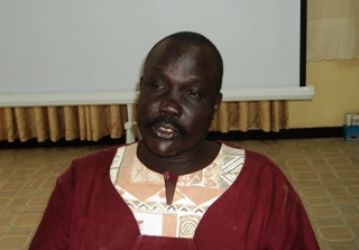S. Sudan security detain editor of independent newspaper
December 10, 2013 (JUBA) – South Sudan security on Tuesday afternoon detained the editor of an independent newspaper before releasing him several hours later.

Bol attributed his arrest and detention to reports he had published about the arrest last week of two colleagues from The Citizen newspaper.
Rama Benjamin and Samir Bol, the editor said, were arrested from Equatoria Inn in Juba only to be released without any charge.
“The security said we have defamed them by reporting the arrest of Rama Benjamin and Samir Bol. They have asked one of their personnel called Pakak to open a case against us’’, Bol said.
“I don’t know which court they will take us to. My statement was taken by Juba North police station. This was after I was arrested in Jebel,’’ he said. Jebel, in Juba, is the national security headquarters.
Bol claimed security officials told him that his paper was filled with ‘‘disturbers.’’
He further claimed that one of his journalists, Wed Deng Albino, was last week arrested and tortured before being released without any charge.
“They [South Sudanese authorities] want to arrest people and expect them to keep quiet. They do not want people to report about their activities which are illegal,’’ Bol said before adding ‘‘they arrested one of our journalists, Wed Deng Albino, last week in the same Equatoria Inn. He was badly tortured.’’
Bol, a vocal journalist was one of the media practioners who last week opposed a directive by the information minister, Michael Makuei Lueth, requiring journalists to register with the government.
Last week, the United States government special envoy for South Sudan and Sudan, Donald E. Booth, said the US was closely monitoring South Sudan’s media environment following recent threatsagainst the media.
‘‘We remain watchful of what is happening and support one of the fundamental issue which is [the] freedom of the press”, said Booth, appointed US special envoy in September this year.
Early this year a ranking by the press freedom advocacy group, Reporters Without Borders ranked South Sudan at position 124 out of 148 countries, a drop of 12 places from the previous ranking.
Article 24 of South Sudan Transitional Constitution, says “Every citizen shall have the right to the freedom of expression, reception and dissemination of information, publication, and access to the press without prejudice to public order, safety or morals as prescribed by law”.
Section II of same article says, “All levels of government shall guarantee the freedom of the press and other media as shall be regulated by law in a democratic society”
ACTIVIST CONCERNED
National security threats on the media, a civil society activist said, was “disturbing” and clearly contravenes Article 24(1)(2) of South Sudan Transitional Constitution.
“These violations of freedom of expression and media late this year demonstrates that south Sudan is on the road to regime governance system”, said Edmund Yakani.
“The national specialised committee on information and telecommunication in the national assembly should react on the recent move by security agencies towards media houses”, added Yakani, also the executive director of Community Empowerment for Progress Organisation (CEPO); a local entity.
(ST)
